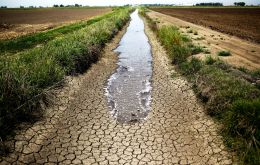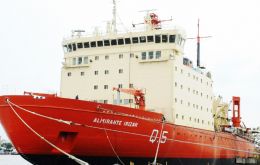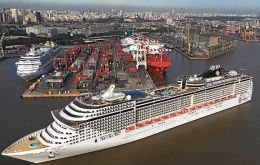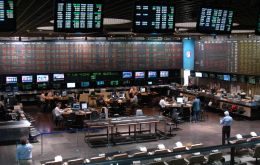MercoPress. South Atlantic News Agency
Tag: Argentina
-
Friday, January 5th 2018 - 10:25 UTC
Drought in north Argentina seriously delaying plating of soy and corn

The drought in Argentina continues in several regions and has generated a delay of planting for the 2017-18 season. A report authored by the institution AgroEducación indicated that La Niña, though subtle, already impacts the region with temperatures above normal and scarce rains.
-
Friday, January 5th 2018 - 10:20 UTC
Argentina sells US$ 9bn in bonds, “at the lowest yields in the country's history”

Argentina sold US$ 9 billion in a three-part dollar bond issuance that was oversubscribed on Thursday, covering nearly a third of its expected financing needs for 2018 early in the year. Latin America’s third largest economy sold US$1.75 billion in five-year bonds at a yield of 4.625%, US$ 4.25 billion of 10-year bonds at 6% and US$3 billion in 30-year bonds at 7%, the ministry said. It said the yields were the lowest in Argentina’s history.
-
Wednesday, January 3rd 2018 - 10:19 UTC
Lack of rainfall in Buenos Aires province affecting soy planting and prices

Argentina's bread-basket province of Buenos Aires will remain mostly dry over the days ahead, meteorologists said on Tuesday, after reporting scant rains over the weekend in the country's biggest and most productive farm area.
-
Wednesday, January 3rd 2018 - 06:36 UTC
Argentina recalls when Malvinas Islands were “illegally” occupied by British forces

In advance of January 3rd, when Argentina recalls the date in 1833 in which allegedly British forces “illegally” occupied the Malvinas (Falkland) Islands, the foreign ministry, Palacio San Martín, released a statement reaffirming its imprescriptible and inalienable sovereignty rights over the South Atlantic archipelago. This is the 185th anniversary of the event.
-
Tuesday, January 2nd 2018 - 06:55 UTC
Icebreaker Irizar calls at Ushuaia on her 2017/18 Antarctica campaign

Argentina's flagship of Antarctica operations is back after ten long years. The refurbished icebreaker ARA Almirante Irizar, called at Ushuaia, Tierra del Fuego, on New Year before leaving for the 2017/18 summer campaign.
-
Sunday, December 31st 2017 - 10:48 UTC
IMF report on Argentina: good, but watch out borrowing to finance the budget deficit

The International Monetary Fund (IMF) on Friday raised its outlook for Argentina’s economic growth to 2.8% in 2017, up from 2.5% seen in October, while keeping its forecast for 2018 growth steady at 2.5%.
-
Friday, December 29th 2017 - 10:26 UTC
Argentina aggressively promoting cruise tourism with lower costs for large vessels

Argentina is expecting 490.000 cruise visitors this season and is targeting a million visitors in the following years, and to promote this policy it has announced a drastic cut in port fees and costs, with special emphasis on those vessels which are over 300 meters long.
-
Friday, December 29th 2017 - 09:38 UTC
Argentina's Merval breaks the 30.000-point barrier and ends 2017 gaining 77%

Merval, the benchmark stock market index in Argentina, ended Thursday's last trading session of 2017 above the 30,000-point barrier for the first time in history. The index rose 2.84% to 30,024.24 after the local government increased the inflation target for the next couple of years, but reinforced its commitment to lower fiscal deficits in the future.
-
Friday, December 29th 2017 - 09:32 UTC
Argentina increases inflation targets for 2018/19, closer to private estimates

Argentina changed its inflation target for 2018 to 15%, up from the central bank’s previous goal of 8-12%, Treasury Minister Nicolas Dujovne said on Thursday, raising expectations for interest rate cuts. The government will postpone by one year its goal of lowering inflation to 5%, pushing it back to 2020, Dujovne said.
-
Friday, December 29th 2017 - 06:55 UTC
US withdraws support for the search of the ARA San Juan submarine

The United States Southern Command announced the U.S. was withdrawing support for the mission to find the Argentine submarine that went missing last month with 44 aboard in the South Atlantic.
